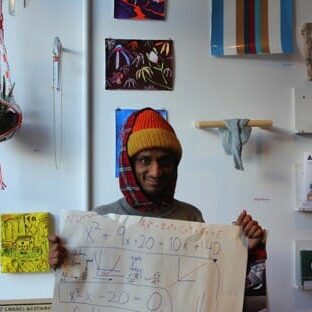
Re(-)solving: Math Jam makes space for feelings and failure
“Everybody has so many feelings around math, mostly shitty, horrible feelings.”
Many people, young and old, find math difficult—that is if they haven’t already disavowed the subject all together.
Nick Dourado is an exquisite performer and instrumentalist, and he’s also a graduate of engineering and ocean physics programs from Dalhousie University.
His month-long residency, Harmonic Spaces, at the Khyber Centre for the Arts, focused on alternative methods of teaching and community learning and included three weekly workshops.
‘Math Jam,’ which was one of three free workshops he created and lead attracted intrigue and questions from artists and academics alike.
“It’s a great creative, meditative, community practice… Everyone’s talking and trying to solve a problem together. Even just as something to do with friends, it’s fun,” says Dourado.
The jam intended to bring people of all backgrounds and levels of mathematical ‘literacy’ together to collectively problem-solve and sometimes also vent about their respective feelings and traumas associated with math.
“Everybody has so many feelings around math, mostly shitty, horrible feelings.”
For Dourado, the workshop is about getting people to ask questions and bring some energy and liveliness to a subject that is too often equated with frustration and inaccessibility.
Helah Cooper, an interdisciplinary student at NSCAD in her fifth year, attended all four of Dourado’s math jams. Cooper says that the workshop connected her to other people who were passionate about math.
“The most interesting things would come up… It was a place where it was comfortable to not know the answer.”
The jams don’t directly apply to her work as an arts student, but she thinks they’ve been worthwhile nonetheless.
Cooper says that many people don’t have a direct access point when it comes to practicing and gaining math skills. The weekly workshop gave her the opportunity to dedicate time to doing math again.
In addition to hosting math jam, Dourado has been tutoring high school and university math students for years.
“I feel like all people who have higher math education should do some form of community care in terms of tutoring because we have such a problem with the literacy of math in our world,” says Dourado.
Ingrained in Dourado’s personal philosophy and his residency, is a desire to explore and prioritize community and collective learning and teaching. His former engineering mathematics professor at Dalhousie University, Guy Kember, influenced this in him.
“He’s one of the coolest artists I’ve ever seen, oh my god,” says Dourado of Kember.
When Kember talks about math his eyes light up. He doesn’t teach with notes or a textbook, and sometimes he himself doesn’t know the answer.
“If there’s a mistake, we go back and find it.”
Though he’s an exceptional math teacher, he doesn’t know how to teach his students how to accept failure.
“[We’re] taught to avoid being uncomfortable and we don’t want to be upset and we don’t want to not know how to do something—you’re not supposed to be comfortable.”
Kember homeschools his 17 and 19-year-old girls and, like Dourado, tutors youth on this side. He thinks that the math taught in elementary and high school is too ambitious, often overwhelming students and leaving them frustrated. Instead, Kember says there should be more of an emphasis on foundational concepts and methods of problem solving.
“If you have learned to learn things when you’re ready for them, then you go over your little hurdle and you’re clear on that before you go on to the next thing—that matters a lot in math.”
As for those who have been traumatized or discouraged by math, Kember says it will take time and persistence.
“Chances are they never hit that good teacher—that one person who said ‘it’s okay,’” says Kember.
Above all, he stresses that people must find a way to make use of math—not just sense of it—to access it’s potential.
“Bringing people back from the traumatized side can only happen if they can see the usefulness. The usefulness shines such a bright light onto everything, that the rest of it can be forgotten.”
Timma Flanagan is in her third year at the University of King’s College student, majoring in math. This term she’s taking a math class about ‘game theory,’ which she thinks is an example of math’s every-day usefulness.
“Math is just a language, like a lot of others. It’s difficult, but everyone can learn it,” says Flanagan.
When Flanagan tells people she studies math, she often gets negative reactions and surprised looks.
“It’s a little isolating that other people can’t or don’t try to relate to (math) or find it intimidating—it definitely becomes a barrier.”
Flanagan says that the way math is usually taught doesn’t expose people to how innovative and interesting the subject can be.
“If you can do equations well enough for a test that’s great, but the second you go further than that you can see a whole world beyond it.”
The fact that many people are not ‘math literate’ and are turned off by the very mention of the subject makes Dourado feel sympathetic and frustrated.
“It’s so weird being connected to an awesome tradition like mathematics and then turning around and seeing the way the rest of the world is taught to access it—because it’s a gift and a beautiful tool. That we hate it and don’t see it in our lives and never hear anything cool about it is wrong… It really speaks volumes to the way we live in our world.”
Math Jam was hosted throughout September and October 2016 at the Khyber Centre for the Arts in Halifax, NS.






